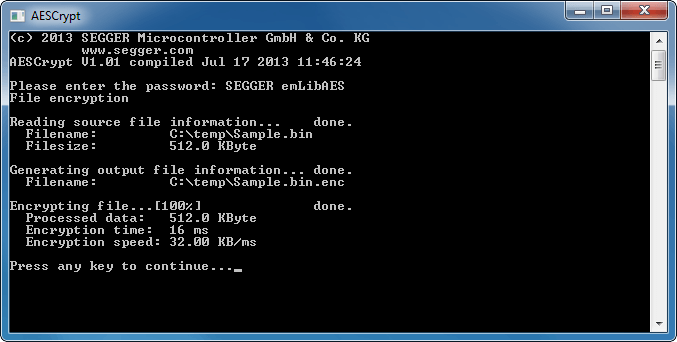C Programming Generate A 256 Bit Encryption Key
This generates a new key and initialization // vector (IV). Using (var algorithm = new AesManaged) algorithm.KeySize = 256; algorithm.BlockSize = 128; // Encrypt the string to an array of bytes. I want to use encryption algorithm available in.Net Security namespace, however I am trying to understand how to generate the key, for example AES algorithm needs 256 bits, that 16 bytes key, and some initialization vector, which is also few bytes. Can I use any combination of values in my Key and IV? All zeros in Key and IV are valid or not? I am using OpenSSL libs and programming in C for encrypting data in aes-cbc-128. I am given any input binary data and I have to encrypt this. I learn that Java has a CipherParameters interface to set IV and KeyParameters too. Is there a way to generate IV and a key using openSSL?
AES support 128, 192 and 256-bit encryption can be determined by the key size, 128-bit encryption key size is 16 bytes, 192-bit encryption key is 24 bytes, and 256-bit encryption key size is 32 bytes.
Office 2010 key generator download. So you can permanently activate Microsoft Office 2010 without paying a dime!!Does not require any kind of product key or registration after the activation. OneNote ImprovementsDownload Microsoft Office 2010 Crack Our TeamDAZ has developed advance activator for Office 2010 that can bypass all the protection layers by cracking executable files.

| #regionEncryption |
| /// <summary> |
| /// Generate a private key |
| /// From : www.chapleau.info/blog/2011/01/06/usingsimplestringkeywithaes256encryptioninc.html |
| /// </summary> |
| privatestaticstringGenerateKey(intiKeySize) |
| { |
| RijndaelManagedaesEncryption=newRijndaelManaged(); |
| aesEncryption.KeySize=iKeySize; |
| aesEncryption.BlockSize=128; |
| aesEncryption.Mode=CipherMode.CBC; |
| aesEncryption.Padding=PaddingMode.PKCS7; |
| aesEncryption.GenerateIV(); |
| stringivStr=Convert.ToBase64String(aesEncryption.IV); |
| aesEncryption.GenerateKey(); |
| stringkeyStr=Convert.ToBase64String(aesEncryption.Key); |
| stringcompleteKey=ivStr+','+keyStr; |
| returnConvert.ToBase64String(ASCIIEncoding.UTF8.GetBytes(completeKey)); |
| } |
| /// <summary> |
| /// Encrypt |
| /// From : www.chapleau.info/blog/2011/01/06/usingsimplestringkeywithaes256encryptioninc.html |
| /// </summary> |
| privatestaticstringEncrypt(stringiPlainStr, stringiCompleteEncodedKey, intiKeySize) |
| { |
| RijndaelManagedaesEncryption=newRijndaelManaged(); |
| aesEncryption.KeySize=iKeySize; |
| aesEncryption.BlockSize=128; |
| aesEncryption.Mode=CipherMode.CBC; |
| aesEncryption.Padding=PaddingMode.PKCS7; |
| aesEncryption.IV=Convert.FromBase64String(ASCIIEncoding.UTF8.GetString(Convert.FromBase64String(iCompleteEncodedKey)).Split(',')[0]); |
| aesEncryption.Key=Convert.FromBase64String(ASCIIEncoding.UTF8.GetString(Convert.FromBase64String(iCompleteEncodedKey)).Split(',')[1]); |
| byte[] plainText=ASCIIEncoding.UTF8.GetBytes(iPlainStr); |
| ICryptoTransformcrypto=aesEncryption.CreateEncryptor(); |
| byte[] cipherText=crypto.TransformFinalBlock(plainText, 0, plainText.Length); |
| returnConvert.ToBase64String(cipherText); |
| } |
| /// <summary> |
| /// Decrypt |
| /// From : www.chapleau.info/blog/2011/01/06/usingsimplestringkeywithaes256encryptioninc.html |
| /// </summary> |
| privatestaticstringDecrypt(stringiEncryptedText, stringiCompleteEncodedKey, intiKeySize) |
| { |
| RijndaelManagedaesEncryption=newRijndaelManaged(); |
| aesEncryption.KeySize=iKeySize; |
| aesEncryption.BlockSize=128; |
| aesEncryption.Mode=CipherMode.CBC; |
| aesEncryption.Padding=PaddingMode.PKCS7; |
| aesEncryption.IV=Convert.FromBase64String(ASCIIEncoding.UTF8.GetString(Convert.FromBase64String(iCompleteEncodedKey)).Split(',')[0]); |
| aesEncryption.Key=Convert.FromBase64String(ASCIIEncoding.UTF8.GetString(Convert.FromBase64String(iCompleteEncodedKey)).Split(',')[1]); |
| ICryptoTransformdecrypto=aesEncryption.CreateDecryptor(); |
| byte[] encryptedBytes=Convert.FromBase64CharArray(iEncryptedText.ToCharArray(), 0, iEncryptedText.Length); |
| returnASCIIEncoding.UTF8.GetString(decrypto.TransformFinalBlock(encryptedBytes, 0, encryptedBytes.Length)); |
| } |
| #endregion |
commented Jun 6, 2014
hi fairly new to the cryptography.. please suggest a resolution |
C Programming Generate A 256 Bit Encryption Key Download
commented Oct 9, 2017 • edited
edited
How-to save -safely- the private key ? Windows registry ? in disk ? I use ASP.NET applications. Test your code |
Chilkat • HOME • Android™ • Classic ASP • C • C++ • C# • Mono C# • .NET Core C# • C# UWP/WinRT • DataFlex • Delphi ActiveX • Delphi DLL • Visual FoxPro • Java • Lianja • MFC • Objective-C • Perl • PHP ActiveX • PHP Extension • PowerBuilder • PowerShell • PureBasic • CkPython • Chilkat2-Python • Ruby • SQL Server • Swift 2 • Swift 3/4 • Tcl • Unicode C • Unicode C++ • Visual Basic 6.0 • VB.NET • VB.NET UWP/WinRT • VBScript • Xojo Plugin • Node.js • Excel • Go
| Discusses symmetric encryption key generation techniques for block encryption algorithms such as AES, Blowfish, and Twofish, or for other algorithms such as ChaCha20.
| |||||
256 Bit Ssl Encryption

© 2000-2020 Chilkat Software, Inc. All Rights Reserved.
